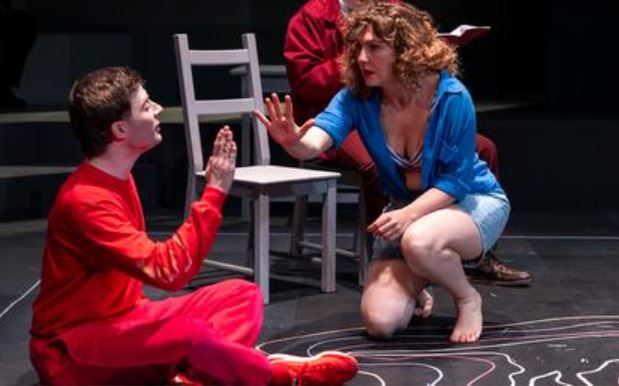Reviewed by Faith Jessel
Meet Christopher Boone, a brilliant Autistic teen whose quest to make sense of his world reveals the true puzzle: the depths of the human heart.
When a neighbour's dead dog sparks a curious investigation, 15-year-old Christopher’s extraordinary mind unravels a web of secrets, lies, and surprising truths that lead him to unexpected discoveries about family, friendship and himself.
With its unique blend of humour, pathos, and insight, this production will leave you moved, inspired, and ready to rethink your assumptions about people, life and love. My goodness, it hits both the sweet and sore spots, and it was long overdue for a Belvoir revamp.
Although Mark Haddon's novel and Simon Stephens' adapted play were groundbreaking for their time, they are now considered problematic due to the lack of representation and input from Autistic people, emphasising the crucial importance of agency. Only through vigilant advocacy can we guarantee that diverse stories are told with accuracy, respect, and empowerment.
Belvoir's signature gutsiness in leading the way in fearless, entertaining social commentary, while amplifying underrepresented voices, is to be applauded. Directed by Hannah Goodwin, and shaped by collaborative expertise with Autistic people, this rendition reflects the most current understandings of Autism. A deep appreciation for its unique expression in each individual.
Christopher's story is just that: His. And casting a neurodivergent person in this role is not only the right choice but also a necessary one. The previous blockbuster whiz bang, whimsical facade has been stripped back, laying bare an extraordinary work that is refreshing, unpretentious and unapologetically honest.
Initially, it's a slightly dark and off-beat mystery of who killed Mrs. Shears' dog; yet, as the story unfolds, the focus shifts from the whodunit to the emotional core of the play—the complexities of family relationships. A tender examination of the ache of parenthood, and the essence of our shared vulnerability. Christopher invites us to reassess our myopic attitudes, encouraging us to see the beautiful conundrums of difference. His unfiltered perspective humorously exposes the absurdity of societal norms and assumptions, never ridiculing him, but rather highlighting the hypocrisy and contradictions of those around him.
Daniel R. Nixon's masterful portrayal of Christopher Boone is effortlessly sublime. Luminous. Without missing a single, authentic beat, he shatters weary stereotypes, bringing to the role a rare and rich layer of theatrical brilliance that is profound and highly nuanced. With remarkable depth and sensitivity, Nixon illuminates the individual whose enormous heart underlies their exceptional intellect. This flawless performance is captivating and, at times, brutally raw. You can’t take your eyes off him.
Difficulties filtering the world are not limited to Autism. When Christopher leaves the insulation of his home and traverses with the bewildering forces of the wider world, the struggles of those around him are also disclosed. A choreographed Greek chorus of community members and adhoc assignations, often ill-equipped or ignorant in understanding or supporting his needs. They are all stunted and challenged in their own way, also wrestling with the social encounters of the world.
Brandon McClelland delivers a subtle, heart-wrenching performance as Christopher’s father Ed, exposing the scarred turmoil beneath his stoic surface. While Matilda Ridgway as his mother Judy, is a delicate balance between love, fear, and utter despair. Both must confront their own emotional exhaustion, guilt, and relationship strain with their son. Brigid Zengeni radiates a compelling presence as Christopher’s strong, compassionate mentor and teacher, Siobahn, serving as a voice of conviction and educated reason, anchoring him amidst the mounting intensity.
Belvoir’s ‘The Curious Incident of the Dog in the Night-time’ embodies what it advocates by employing simple but effective visual warnings for sensory triggers. Every performance is inclusive. However, as we continue to navigate the complexities of Autism, it is clear we are still in the infancy of understanding this multifaceted neurotype. Despite progress, stigma and ignorance persist. Theatre, with its unique ability to humanise and empathise, can offer a powerful conduit and counterbalance.
Entertaining, genuine and uplifting, this phenomenal production is a celebration of embracing our differences while finding common ground. It defies simplification, propelling the narrative far beyond the ‘quirks’ of a diagnosis, unveiling the person beneath. It's a joy to be in the audience. Go see it.
See https://belvoir.com.au/productions/curious-incident/ for further details.

